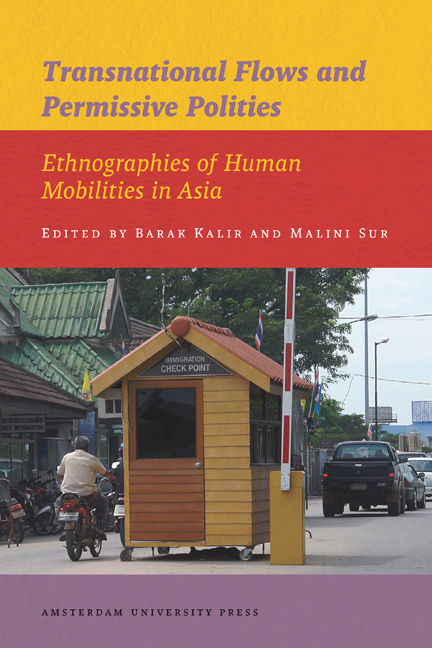Book contents
- Frontmatter
- Contents
- List of Tables, Maps, Figures and Photographs
- Acknowledgements
- Introduction: Mobile Practices and Regimes of Permissiveness
- 1 Illegality Rules: Chinese Migrant Workers Caught up in the Illegal but Licit Operations of Labour Migration Regimes
- 2 Contesting the State of Exception in the Afghan-Pakistani Marchlands
- 3 ‘Looking for a Life’: Rohingya Refugee Migration in the Post-Imperial Age
- 4 Smuggling Cultures in the Indonesia-Singapore Borderlands
- 5 Trade, Transnationalism and Ethnic Infighting: Borders of Authority in Northeast Borneo
- 6 Bamboo Baskets and Barricades: Gendered Landscapes at the India-Bangladesh Border
- 7 Moving between Kerala and Dubai: Women Domestic Workers, State Actors and the Misrecognition of Problems
- 8 Emigration of Female Domestic Workers from Kerala: Gender, State Policy and the Politics of Movement
- 9 Mainland Chinese Migrants in Taiwan, 1895-1945: The Drawbacks of Being Legal
- 10 ‘Playing Edge Ball’: Transnational Migration Brokerage in China
- Epilogue: Irregular Mobilities and Disjunctive Moralities
- About the Editors and Contributors
- Bibliography
- Index
- Publications Series
7 - Moving between Kerala and Dubai: Women Domestic Workers, State Actors and the Misrecognition of Problems
Published online by Cambridge University Press: 15 January 2021
- Frontmatter
- Contents
- List of Tables, Maps, Figures and Photographs
- Acknowledgements
- Introduction: Mobile Practices and Regimes of Permissiveness
- 1 Illegality Rules: Chinese Migrant Workers Caught up in the Illegal but Licit Operations of Labour Migration Regimes
- 2 Contesting the State of Exception in the Afghan-Pakistani Marchlands
- 3 ‘Looking for a Life’: Rohingya Refugee Migration in the Post-Imperial Age
- 4 Smuggling Cultures in the Indonesia-Singapore Borderlands
- 5 Trade, Transnationalism and Ethnic Infighting: Borders of Authority in Northeast Borneo
- 6 Bamboo Baskets and Barricades: Gendered Landscapes at the India-Bangladesh Border
- 7 Moving between Kerala and Dubai: Women Domestic Workers, State Actors and the Misrecognition of Problems
- 8 Emigration of Female Domestic Workers from Kerala: Gender, State Policy and the Politics of Movement
- 9 Mainland Chinese Migrants in Taiwan, 1895-1945: The Drawbacks of Being Legal
- 10 ‘Playing Edge Ball’: Transnational Migration Brokerage in China
- Epilogue: Irregular Mobilities and Disjunctive Moralities
- About the Editors and Contributors
- Bibliography
- Index
- Publications Series
Summary
Gender, Illegality and Licitness
Mobility across international borders as well as state attempts to curtail this are facts of life for women such as Seena, Suja, Mariyam and Hussaiba who have worked for up to twenty years as foreign domestic workers in the Gulf. They are part and parcel of the large number of impoverished women from Kerala who leave their native lands and arrive in Dubai. Some had first worked elsewhere – Hussaiba in Saudi Arabia, Seena in Oman, and Mariyam in Oman, Bahrain and Ajman (another Emirate) – but at a certain moment they all had come to Dubai, where they joined the large contingent of foreign women who engage in domestic work. After some years of work, they would return to Kerala, but quite often they would then come to work in Dubai again. In the course of these multiple migrations, these foreign domestic workers have engaged at various moments in acts and activities that state agents would define as illegal. They leave India without a clearance, reside in the UAE with non-work visas, overstay their visa or abscond and then often have to make do without a passport and a residence permit. They engage with a network of agents in order to get duplicate passports and other fake documents. In some cases, they do so because they have no other options, yet some also go through illegal channels because they consider it easier and quicker than when they would go through state bureaucracies.
There is a strong dissonance between debates on gender and illegality on the one hand and the narratives of these foreign domestic workers about their problems, fears and aspirations on the other. In academia and beyond, men tend to be defined as economic migrants, willing to pay smugglers considerable amounts of money in order to reach their desired destination, while women are mostly projected as unwilling, powerless victims of unscrupulous traffickers who intend to exploit them in the sex trade. Such images of men as economic actors and women as sexual victims are also commonly present in mediated debates on global human rights and are actively employed in efforts to push for the state regulation of poor women's migration. It is certainly true that there are cases of sexual exploitation of migrant women. However, such a unidimensional perspective jars against the needs and desires that Malayalee domestic workers themselves express.
- Type
- Chapter
- Information
- Transnational Flows and Permissive PolitiesEthnographies of Human Mobilities in Asia, pp. 151 - 168Publisher: Amsterdam University PressPrint publication year: 2012

